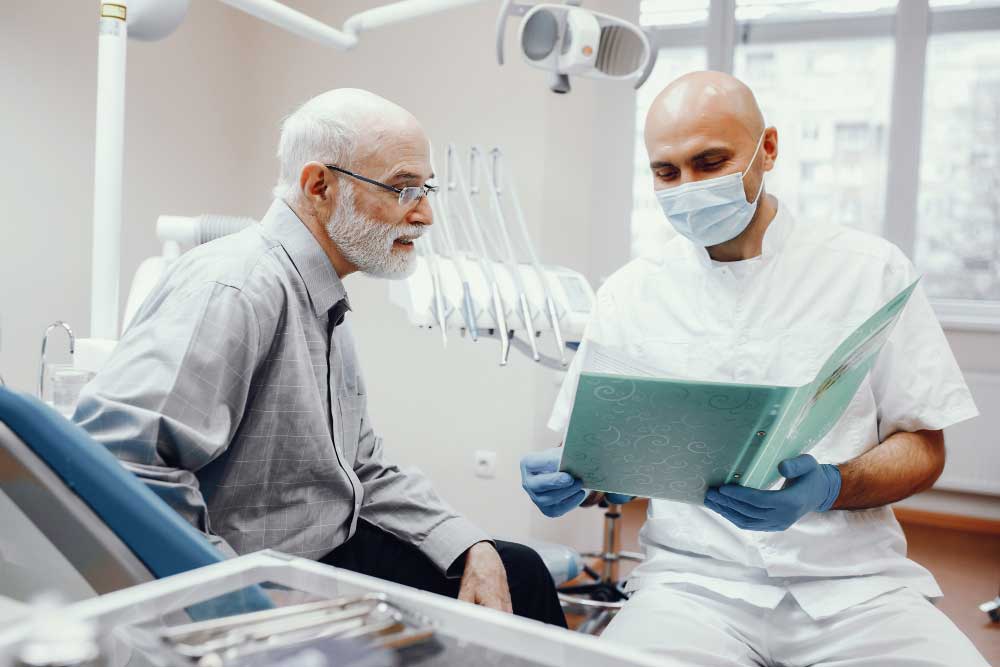
Caring for Dental Implants: A Comprehensive Guide
Get ready to unlock the secrets to maintaining dental implants as we embark on this smile-transforming adventure together.
Dental Implants
17 August 2023
At Innovative Dental, we believe that a radiant smile is not just a fleeting moment but a lifelong expression of joy and confidence. Dental implants, the marvels of modern dentistry, offer a permanent solution for missing teeth, empowering you with a smile that stands the test of time.
Dental implants offer an impressive remedy for tooth loss. Yet, suppose you’re contemplating the prospect of acquiring one or more implants. In that case, you might be intrigued to unravel the actual composition of a dental implant.
While the term itself might not divulge the intricate structure, a dental implant system encompasses three pivotal constituents, each of whose role cannot be simultaneously inserted within your oral cavity. These components, arranged from the base upward, consist of:
- The post is sometimes called the screw, body, or fixture.
- The abutment.
- The crown is alternately known as the prosthetic or restoration.
This trio of elements collectively culminates in a potentially enduring solution that closely mimics the aesthetics and functionality of natural teeth. This comprehensive approach effectively addresses concerns related to bone loss and other complications associated with missing teeth.
This blog will guide you through the process of maintaining dental implants with expert tips and essential precautions to keep your smile shining bright for years to come.
Aftercare Instructions

After dental implant surgery, it is important to emphasise proper post-operative care to facilitate optimal recovery and eventual re-establishment of oral well-being. The dentist will supply specific guidelines for aftercare on an individual basis. Nonetheless, the subsequent standard instructions for dental implant care are provided:
Please refrain from eating: It is crucial to wait until the effects of anaesthesia or numbing agents have subsided before resuming eating.
Address bleeding: As the dentist directs, the patient should position clean gauze over the implant site. Gently apply moderate pressure for around half an hour to assist in managing bleeding. Additionally, rinsing with warm salt water can aid in reducing bleeding and oral bacteria.
Gauze replacement: Carefully remove and substitute the gauze regularly with fresh gauze. Bite down gently but firmly to slow down the bleeding. Regular gauze changes are essential to prevent infection.
Avoid mouth rinsing: Most dental professionals strongly recommend refraining from mouth rinsing within twenty-four hours after implant placement. Which helps minimise bleeding and the risk of disrupting the blood clot. When mouth rinsing becomes necessary in subsequent days, allow saline water to flow out of the mouth without vigorous swishing.
Soft food diet: After dental implant surgery, patients should stick to a soft food diet to avoid irritating or dislodging the forming blood clot.
Allow for rest: Following dental implant surgery, sufficient rest is essential for the body’s healing process. Hence, avoiding strenuous activities is advised.
Manage swelling: Applying ice packs to the facial exterior can assist in reducing swelling. This practice can be continued for 20 to 30 minutes within a 24-hour.
In addition to the immediate post-operative instructions for dental implant care, it is crucial to recognise that regular follow-up dental appointments are also pivotal in upholding the condition of dental implants. These appointments offer opportunities to monitor the status of the implants and identify any potential issues.
Daily Care and Maintenance
While dental implants indeed provide a transformative solution, their longevity and effectiveness hinge on diligent care. Learning how to maintain your implants to ensure their durability and visual appeal is a crucial aspect.
Neglecting the upkeep of your dental implants can precipitate an array of problems, including inflammation, discomfort, pain, bone deterioration, and the onset of conditions like peri-implantitis—a form of gum disease that affects implants. Safeguarding against these potential issues necessitates adhering to a comprehensive oral hygiene regimen.
For a radiant smile and implants that stand the test of time, consider these vital practices:
- Utilise a soft-bristled toothbrush to prevent enamel and implant damage. Brush twice every day.
- Make sure to change your toothbrush every 2-3 months of use.
- Opt for low-abrasive toothpaste to avoid detrimental effects on the implant.
- Practice daily flossing, which is particularly crucial for removing plaque around implants.
- Use an alcohol-free mouthwash.
- Sustain consistent oral hygiene practices with non-abrasive products.
This comprehensive approach ensures your dental implants remain robust and functional, promoting a long-lasting investment in oral well-being.
Lifestyle Factors Affecting Your Dental Implant Maintenance

The durability and resilience of dental implants extend beyond the mere commitment to oral hygiene practices. Acknowledging and adjusting certain lifestyle behaviours becomes imperative in safeguarding these prosthetic teeth and deriving their maximum benefits. Delving into this perspective, which is crucial to explore several lifestyle habits that possess the potential to undermine the stability and effectiveness of dental implants:
Avoid Hard and Sticky Foods: Steering clear of hard and sticky foods is essential for the well-being of dental implants. These foods can exert undue pressure on the implants, potentially leading to damage or fractures. Hard foods like ice, hard candies, and crunchy snacks can compromise the implants’ stability and surrounding structures. On the other hand, sticky foods tend to adhere around the implants, increasing the risk of plaque accumulation and potential complications. By maintaining a diet that avoids these problematic foods, individuals can contribute to their dental implants’ longevity and successful performance, preserving aesthetics and functionality.
Avoid Using Your Mouth as a Tool: Refraining from using your mouth as a tool is a fundamental practice to safeguard the integrity of dental implants. Using your teeth to open packages, tear off tags, or perform tasks beyond their intended function can exert excessive pressure on the implants, potentially leading to fractures or damage. This misuse places undue stress on both the implants and the surrounding oral structures. By cultivating the habit of using appropriate tools for everyday tasks and treating dental implants with care, individuals can contribute to their implants’ long-term success and durability, ensuring a confident and functional smile.
Nourishing Diet: Pursuing optimal oral health and preventing potential complications linked to dental implants necessitate consciously selecting dietary options. An integral facet of this approach involves moderating the intake of sugar and starch, both of which contribute to the formation of plaque—a sticky bacterial film capable of triggering gum inflammation and tooth decay. Individuals can fortify their implant’s longevity by embracing a well-balanced and nutrient-rich diet.
Moderating Alcohol Consumption: Another lifestyle practice that casts a shadow on dental implants is the consumption of alcoholic beverages. Managing and minimising alcohol intake can emerge as a beneficial stride toward fostering the sustained prosperity of teeth implants over the long term.
Abstaining from Tobacco: Amongst the array of lifestyle choices, smoking is a dangerous habit with dire implications for implant preservation. Robust scientific inquiry has underscored the link between smoking and heightened implant failure rates. The toxic compounds in cigarette smoke can impede blood circulation and disrupt the optimal healing process at the surgical site. As a result, most dental professionals diligently factor in smoking habits before endorsing the pursuit of dental implants.
The proactive alignment with these guidelines aids in fortifying the foundation of dental implant sustainability. Beyond the diligent care of teeth and gums, embracing a health-conscious diet, moderating alcohol intake, and eschewing tobacco products construct a collective approach to nurturing the long-term well-being of dental implants. Through these concerted endeavours, the prospect of maintaining a radiant and enduring smile remains an attainable reality.
Loosening and Fracture of Dental Implants
Loosening and fracture of dental implants can be attributed to several factors, each of which can impact the longevity of the implant. Here are some possible reasons and their effects:
1. Peri-implantitis
Cause: Bacterial infection around the implant site leading to inflammation and bone loss.
Effect: Weakening of bone structure, causing implant instability and potential fracture if not addressed promptly.
2. Poor Oral Hygiene
Cause: Neglecting regular brushing, flossing, and professional cleanings.
Effect: Plaque buildup can lead to inflammation, bone loss, and compromised implant stability.
3. Occlusal Overload
Cause: Excessive bite force due to grinding or clenching of teeth.
Effect: Implant and supporting bone can become stressed, potentially leading to fracture or loosening.
4. Insufficient Bone Quality or Quantity
Cause: Inadequate bone density or volume at the implant site. Effect: Reduced stability, poor osseointegration, and increased risk of implant fracture or mobility.
5. Surgical Complications
Cause: Improper surgical technique, incorrect implant positioning.
Effect: Suboptimal osseointegration, potential bone loss, and increased risk of implant failure.
6. Systemic Health Issues
Cause: Conditions like uncontrolled diabetes, autoimmune diseases, or poor healing.
Effect: Slower healing, decreased bone density, and impaired osseointegration, affecting implant stability.
7. Smoking and Tobacco Use
Cause: Reduced blood flow and impaired healing due to nicotine.
Effect: Hindered osseointegration, increased risk of infection, and compromised implant integrity.
8. Untreated Bruxism
Cause: Unconscious teeth grinding and clenching.
Effect: Excessive force on implants can lead to fractures, loosening, or implant failure.
9. Implant Material Quality
Cause: Poor-quality or non-compatible implant materials.
Effect: Corrosion, instability, and increased risk of fracture over time.
10. Allergic Reactions
Cause: Rare allergic reactions to implant materials.
Effect: Inflammation and potential implant failure.
Effects on Implant Longevity: Shortened Lifespan: Loosening and fracture can lead to implant failure and necessitate replacement.
Bone Loss
Inadequate support can result in bone loss around the implant, compromising stability.
Aesthetic Concerns: Loosening or fracture may impact the restoration’s appearance, affecting the smile’s overall aesthetic.
Financial Impact: Addressing implant complications may involve additional procedures and costs. You must maintain exceptional oral hygiene, attend regular dental check-ups, address bruxism, avoid smoking, and adhere to your dentist’s post-operative instructions to guarantee the longevity of your dental implants.
Early detection and intervention can significantly reduce the risks of loosening and fracture, promoting a successful and enduring implant outcome.
The Position of Dental Implant
A dental implant’s position is critical to its longevity and overall success. Proper implant positioning involves angle, depth, and alignment within the jawbone. Here’s how implant position can affect the longevity of a dental implant:
1. Osseointegration and Stability
Optimal Positioning: When an implant is precisely placed in the jawbone, it enhances the chances of successful osseointegration (bone fusion). This results in a stable foundation for implant restoration.
Poor Positioning: Improper placement can lead to compromised osseointegration, reduced stability, and an increased risk of implant failure over time.
2. Biomechanical Load Distribution
Correct Alignment: Properly positioned implants distribute chewing forces evenly across the implant and surrounding bone, reducing the risk of overloading and potential complications.
Incorrect Alignment: Misaligned implants may bear excessive forces on certain areas, leading to uneven pressure distribution, bone resorption, and implant failure.
3. Aesthetic and Functional Outcome
Natural Appearance: Precise implant placement contributes to a more natural-looking and symmetrical smile, ensuring the restoration aligns seamlessly with adjacent teeth.
Challenges with Alignment: Poorly positioned implants may result in aesthetic issues, requiring additional restorative procedures to achieve a pleasing smile appearance.
4. Proximity to Adjacent Structures
Avoiding Adjacent Structures: Proper implant positioning ensures safe placement away from neighbouring teeth, nerves, and sinuses, minimising the risk of damage or complications.
Complications from Proximity: Incorrect placement could damage adjacent structures, requiring corrective measures or implant removal.
5. Ease of Maintenance
Access for Cleaning: Well-positioned Implants allow for effective oral hygiene practices, making cleaning and maintaining the area around the implant easier.
Challenges with Cleaning: Poorly positioned implants may be challenging to clean properly, increasing the risk of plaque buildup, infection, and peri-implantitis.
6. Long-Term Comfort
Tissue and Nerve Irritation: Properly positioned implants are less likely to irritate surrounding tissues or impair nerves, contributing to long-term comfort and reduced risk of complications.
Discomfort and Irritation: Implants placed in an incorrect position can cause discomfort, pain, or sensory disturbances, affecting the patient’s quality of life.
7. Overall Treatment Success
High Success Rate: Precise implant positioning is associated with a higher likelihood of successful outcomes, long-term stability, and minimal need for corrective procedures.
Reduced Success Rate: Poorly positioned implants may experience higher complications, necessitating additional interventions and potentially reducing the overall success of the treatment.
In essence, meticulous planning and precise placement of dental implants ensure their longevity and minimise the risk of complications. Your dental professional’s expertise in implant placement significantly influences the implant’s ability to integrate with the bone, provide stable support for restorations, and contribute to a healthy, functional, and beautiful smile over the years.
Signs of Dental Implants Failure
Undergoing a dental implant procedure warrants thoughtful consideration, given the intricate nature of the mouth and teeth involved. Entrusting the procedure to a skilled professional is crucial, as numerous potential complications can arise if not handled by an experienced practitioner. Dental implant failure can manifest in the initial and long-term stages, prompting the need for vigilance. Recognising the signs of such failure is paramount, with key indicators including:
- Severe pain and discomfort
- Gum recession around the implant
- Challenges with chewing and biting
- Shifting or loose implants
- Swollen gums
- Implant micro-movements
- Sudden allergic reactions
- Teeth grinding
Each sign has implications, such as excruciating pain versus normal healing discomfort, abnormal implant movement, or allergic reactions to implant materials. Understanding and identifying these signs are essential to seeking timely professional intervention and safeguarding the success of dental implant procedures.
Regular Visits to Your Dentist
Regular visits to your dentist play a pivotal role in ensuring the optimal care and maintenance of your dental implants. These routine check-ups serve as proactive measures to monitor the health and stability of your implants, allowing your dentist to identify and address any potential issues early on. Through comprehensive examinations, your dentist can assess the integration of the implants, the condition of surrounding tissues, and the overall functionality of your oral implant restoration.
These scheduled appointments offer an opportunity for thorough cleaning and removal of any plaque buildup that could compromise the longevity of your implants. Additionally, your dentist can provide personalised guidance on maintaining impeccable oral hygiene practices tailored to your specific implant needs. By committing to regular dental visits, you foster the lasting success of your dental implants and ensure a healthy and confident smile for years to come.





